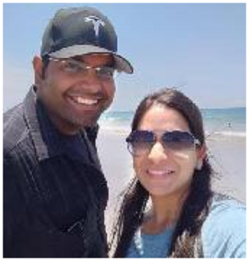
Vivek Sharma
Editor-In-Chief
krrisha.com

There is no definition for a right decision, a decision might be correct from someone's view or the situation in which it is taken where as it might be completely wrong from other perception.
Before acting on a decision one should not only see what it may fix but also introspect what it can break, if it damages more than it heals probably one should not act upon it;, but again you can never fully understand the aftereffects of a decision. It is best if you think as much as you can before coming to any conclusion. Consider every fact and perception then whatever suits best, do it.
People always tend to think that sometimes the outcome of the decision taken will only impact them, no one will be affected by that step, but this is NEVER the case. Each and every action/decision taken by someone no matter how personal it is may be, affect others too. Sometimes not directly but indirectly as well.
Facts should always be kept above perception, but sometimes things goout of box, at that time perceptions plays a very crucial role. It's very difficult to take a decision , sometimes a decision taken fully on the basis of facts ends up to be a bad one and the one taken according to your perception is proven right.
Take everything into consideration, try to give weightage to facts but according to situations.
Inference:‘Right decision’ is subjective and cannot be defined in one particular manner. Any decision taken has consequences that affect more than one person. Facts should be kept above perception for making decisions but this selection is situation dependent.
Shubham Sinha

Whatever you feel or say is right decision.
I can see now that experience helps a lot. Knowledge supports the decision taken with the help of experience.
70% fact and 30%perception should be the ratio while taking decisions.
Inference: Feeling is the parameter of taking right decision. Experiences are in accordance with knowledge and fact-perception ratio shall be 70:30.
Manas Agarwal

Nothing is either right or wrong. It’s the perception and experience that changes everything. Somewhere sun rises right on time, somewhere sun rises late, and it doesn’t let mankind to stop their pace. Right and wrong merely becomes meaning less when situations change fast. So a right decision is something which our eyes and experience perceive as right.
Knowledge is knowing wisdom, experience is implementing the wisdom. Knowledge is merely a path. Experience is a vehicle which runs on the path. Knowledge is absolute and vague it can be in any direction. Experience is straight and has only one direction that is connected to life. So therefore experience helps in finalising the decision.
Perception is deceptive, it’s an illusion. Our thought process is our biggest enemy and a battle merely comes to an end with wrong perception, if perception are not cleansed from time to time. Facts are all history you can never tell if it is 100 percent right unless you have lived it. Even Bible and Quran has been altered in their own way. In a broader sense these both are vicious.
The correct approach while taking a decision is to have a correct perception with experienced facts. For a decision their weightage should be 50:50
Inference: Individual’s perception and experience determine the rightfulness of one’s decision.Rightfulness of a decision can be affected by the situation in which it is taken. Experience frame the final body of a decision. Perceptions are illusory in nature and vary subjectively. For right decision, perception should be used with experienced facts in a 50/50 ratio.
Sakshi Arora

Right decision is one where all the facts and information have been taken into consideration before decision making and all the possible options have been explored and quantified.
An unbiased decision is usually the right one.
All decisions are based on our knowledge of things but facts should not be overlooked during the decision making process.
Facts obviously should be given more weightage than perception. Perception might be wrong. The decision won't be unbiased if it is based on perceptions. 10:90 could be the ratio.
Inference: Right decision is one where facts and information are taken into account and bias is kept aloof. Perception shall carry a weightage of 10 while facts that of 90 thereby making the perception:fact ratio 10:90.
Harshita Tewari

Right decision for me is decisions based on moral conscience, self-
interest and future implications.
Definitely, past experience play bigger role but knowledge too is equally important.
For me 1:1, both play equal part in decision making.
Inference: Decision based on moral-conscience, self-interest and has future implications is defined as right decision. Experience play a bigger role than knowledge but the latter has its own significance. Both perception and fact carry equal weightage in the ratio— 1:1.
Pratyush Sinha

There is no right decision. There is just decision. You learn from it but you should never judge it. Right or wrong is always in retrospect.Both have to be there, unless it is a totally new scenario, in which case you have to go by your knowledge.It is very difficult to quantify something like this. Facts are definitely the way to go in most cases. Perception is affected by some form of bias and therefore may not be the best parameter in making decisions.
Inference: Rightfulness of a decision is retrospective and follows only after one has learnt from it. Both knowledge and experience play their role in decision making; knowledge takes over for new situations. Facts are more reliable as perceptions have biases involved, a fixed ratio can not be determined.
Aishwarya Sharma

Before defining right decision, one should have an idea of what decision is all about. A decision is a conclusion or resolution reached after consideration. A decision can be right or wrong based on ones perspective i.e. a decision takencan be favourable to him/her but it may or may not be favourable to other member or strata. For e.g. a husband is taking decision to move abroad and make the life better for his family may be his right decision but from family’s perspective it might be a wrong one as they will be distanced for the sake of some money.
Right decision are those where there is a WIN-WIN situation for you & your family.
A wise decision is one which is taken with knowledge & experience .i.e. why should one think taking decision always involves second opinion of some elderly person or whom he/she thinks cares about them the most.
Before taking decision one should be aware of the pros & cons of the same as it may or may not bring adverse effect on one’s life hence perception and facts should be taken into consideration while taking any decision as this will give one the insight about the end result.
Inference: Rightfulness of a decision is dependent on one’s perspective. A right decision is an all win situation. Both knowledge and experience are significant. Both perception and facts play their part in decision making.
Shashank Gautam

Before taking a decision, properly outline and then analyse p all the points that will impact the outcome of the decision.
Thus any decision taken, which as per the current situation, is benefitting a larger group of people is a Right Decision.
Now in the digital world, knowledge can easily be acquired but experience is earned. While taking a decision, I’ll give priority to experience and will blend the latest knowledge into the past experience.
Perception is the product of experience. We make good or bad perception
about something, which is totally driven by kind of experience we carry.
If the decision is affecting people’s sentiment and emotions then, I think facts should dominate the decision; if the decision is directly affecting someone’s emotions then both Facts as well the perception that you or other people carry should be considered in a ratio of 50:50.
Inference: A decision taken in favour of a large number of people is right decision. Experience should be blended with knowledge for making decision. Facts should be prioritised over perception and facts and perceptions of concerned people should be regarded in a 50:50 ratio.
Manali Mehrotra

Compiled by Soumya Sheel
No decision can universally be termed as right or wrong. A decision which is appealing as right in present scenario might appear wrong in future. For me, a decision which is benefiting the present situation as well as carry a scope that the repercussions caused by this decision in future can be moulded according to future situation.
Experience and Knowledge both are important when it comes to decision. Personally, I will choose experience over knowledge because sometimes through experience we learn some small things which cannot be acquired through knowledge.
Perception arises from experience. Anybody who is considering
experience as an integral component of decision making will definitely give more importance to perception. In my case as well I will say perception v/s facts ratio should be 70:30.